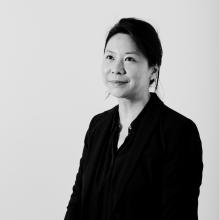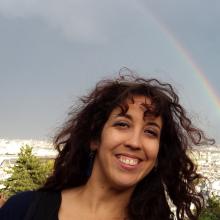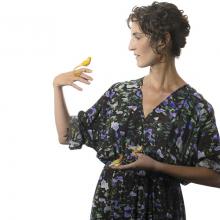Montréal team

Alice Ming Wai Jim
Click here for Bio
Alice Ming Wai Jim is Professor and Concordia University Research Chair in Ethnocultural Art Histories in Montreal, Canada. She is co-editor of the journal Asian Diasporic Visual Cultures and the Americas (Brill with Concordia and NYU). Jim is also Adjunct Professor in Graduate Studies at OCAD University, Toronto (2021-2024). An art historian and curator, her research on diasporic art in Canada and contemporary Asian art has generated new dialogues within and between ethnocultural and global art histories, critical race theory, media arts, and curatorial studies. She co-convened the NYU Global Asia/Pacific Art Exchange, GAX 2019 Tiohtiá:ke (Montreal): Asian Indigenous Relations in Contemporary Art. Jim is a SSHRC co-investigator and FQRSC PI for the Trans-Atlantic Platform project, Worlding Public Cultures, and a collaborator on the SSHRC Partnership Grant project Thinking Through the Museum. Her current SSHRC-funded research project examines Afrofuturism and Black Lives Matter in the Canadian art scene. Jim is a member of the College of New Scholars, Artists and Scientists of the Royal Society of Canada.

Analays Alvarez Hernandez
Click here for Bio
Dr. Analays Alvarez Hernandez is a Havana-born art historian and independent curator based in Montréal/Tiohti:áke/Mooniyang as an uninvited guest. Her research focuses on contemporary art, with an emphasis on public art, global art histories and diasporas, Latinx-Canadian art, and curating. She has received a bachelor’s degree in Art History (2005) from the Universidad de La Habana, and her doctorate (2015) from the Université du Québec à Montréal. From 2016 to 2018, she was a postdoctoral fellow in the Department of History of Art at the University of Toronto. Since 2019, she is Assistant Professor of Global Art at the Université de Montréal. Her main research projects focus on ‘domestic art galleries’ in (post)socialist societies, and the activity of Latinx-Canadian artists. She has co-edited Latin American Art(ists) from/in Canada (Latin American and Latinx Visual Culture journal, Winter, 2022) and ‘Revised Commemoration’ in Public Art: What Future for the Monument? (RACAR, Fall, 2021).
Edith-Anne Pageot
Click here for Bio
A specialist of modernisms in Quebec and Canada, I am interested in historiography, the relationship between art and craft, and the interdisciplinary, transcultural and transnational logic that permeate the modes of production, exhibition and reception of art objects. Two major questions underlie and shape my research path, and serve as a guiding thread for the different bodies of work studied: how to (re)conceptualise the relationships between canons and margins without denying the fractures and their distressing effects? How can we practise an ethically, responsible art history based on epistemological decentration, in order to contribute to the development of research and teaching environment, aimed at rebuilding the modalities of living together? Among my current research projects, I am preparing a monograph pertaining to Artistic Culture at Manitou College. Agentivity and Self-Determination Strategies (SSHRC). I am collaborating to the creation of the first Massive open online course in French on Indigenous arts. This project is the result of a partnership between UQAM and the Montreal Museum of Fine Arts. Another current research project examines the use of fibre in modern and contemporary arts in Quebec, from a transcultural and transnational perspective.
May Chew
Click here for Bio
May Chew is an Assistant Professor at the Mel Hoppenheim School of Cinema and Department of Art History at Concordia University. Her current research focuses on diasporic media and archives, haunting, decolonial aesthetics, and critical genealogies of immersion. Her work appears in Imaginations, the International Journal of Heritage Studies, the Journal of Canadian Art History, and an issue of the journal PUBLIC on the theme of Archives/Counter-Archives, which she co-edited with Janine Marchessault and Susan Lord. Along with Worlding Public Cultures, she also collaborates on Ethnocultural Art Histories Research in Media and Archive/Counter-Archive.

Maya Rae Oppenheimer
Click here for Bio
Maya is a daughter, sister, aunt, plant-mother, friend and colleague who receives financial remuneration as a writer/researcher/artist/educator. She preoccupies herself with writing as social practice, and the tangles of historical narratives that inform our contemporary worldview. Structures of institutional knowledge formation and validation are often the focus of her inquiries, from museum narratives to histories of social psychology. Experimental writing, performance, radical pedagogy, wandering, DIY tactics and rogue archival inquiries are part of the toolkit she brings when reconsidering and recalibrating histories and ways of knowing and being in the world.
Maya is also an Assistant Professor in Art History in the Faculty of Fine Arts at Concordia University. She holds a PhD in Humanities and Cultural Studies from the University of London and has taught at the Royal College of Art, Imperial College London, and the Cass School of Art and Design; held research positions at the Victoria & Albert Museum; served as Executive Trustee for the Design History Society; showed art at the Science Museum in London, the Rag Factory, GV Arts, and Cabinet in NYC. She was also co-director of Metalab a research platform run by the Royal College of Art and University of London.

Varda Nisar
Click here for Bio
Born and raised in Karachi, Pakistan, I am a PhD Candidate who is attempting to understand the complicated nature of museums in Pakistan against the background of dictatorships. Growing up in a city where spaces for creative experiences were limited, I established the Karachi Children’s Art Festival in 2014, and later headed the Educational Program for Karachi Biennale’s inaugural edition in 2017. As part of a collaboration between Karachi Biennale and Tetley, Leeds, I facilitated a project that took its inspiration from artist Madiha Aijaz’s work and worked with young adults to redefine ‘library’ for our specific context. Currently, I am involved in moderating a speaker series titled (Art+Micro)history: Contemporary Artistic voices from The South that aims to highlight how artists living and working in Karachi explore issues of linked to urbanisation and development, while also trying to understand the implications of working in highly charged environments.